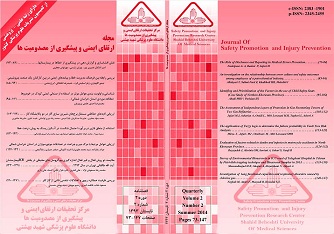بررسی رابطه بین فرهنگ مدیریت خطا و پیامدهای ایمنی در بین کارکنان صنعت پتروشیمی
ارتقای ایمنی و پیشگیری از مصدومیت ها,
دوره 2 شماره 2 (2014),
20 آذر 2014
,
صفحه 85-94
https://doi.org/10.22037/meipm.v2i2.7033
چکیده
سابقه و هدف: خطاهای انسانی از دیرباز به دلیل بروز حوادث و بر هم زدن برنامه ریزی ها و عملکردهای بشر در کانون توجه متخصصان ایمنی و ارگونومی قرار داشته اند. پس از ناکامی نظریه فرهنگ خطای صفر، رویکرد جدید فرهنگ مدیریت خطا با نگاهی مثبت و سازنده به خطا، انسان و سیستم، مطرح گردیده است. اين مطالعه درصدد است که ارتباط احتمالی میان فرهنگ مدیریت خطا را با رخداد حوادث به عنوان شاخصي از پیامدهای ايمني مورد بررسي قرار دهد.
روش بررسی: این مطالعه، یک بررسی توصیفی- تحلیلی می باشد که در بین نمونه تصادفی 424 نفر از کارکنان شاغل در یک صنعت پتروشیمی اجرا شد. برای سنجش فرهنگ مدیریت خطا از پرسشنامه جهت یابی خطا با پنج حیطه و 19 آیتم و پیامدهای ایمنی با چهار سوال و بصورت خودگزارشی مورد ارزیابی قرار گرفتند. برای تجزیه و تحلیل داده ها و تعیین معنی داری رابطه ها از روش آزمون کای اسکور استفاده شد.
یافته ها: میانگین امتیاز کلی فرهنگ خطا 69/91 با انحراف معیار 7/34 بدست آمد که نشان دهنده فرهنگ مدیریت خطا در این سازمان بود. نتایج حاصل از آزمون کای اسکور میان فرهنگ مدیریت خطا با حوادث جزئی، حوادث جدی و خسارت به تجهیزات روابط معنی داری نشان داد، . در بررسی ارتباط حیطه های فرهنگ خطا و چهار پیامد ایمنی مورد بررسی نیز روابط معنی داری دیده شد.
نتیجه گیری: نتایج این پژوهش ارتباط میان فرهنگ مدیریت خطا و پیامدهای ایمنی را نشان داد. مطالعه پژوهش های گذشته نیز وجود، یک جو سازمانی با فرهنگ مدیریت خطا، ارتباطات باز و تمرکز روی حل مشکلات و یادگیری را برای ایمنی امری حیاتی می دانند. امید است با انجام مطالعات بیشتر، کنترل متغیرهای مداخله گر و رفع محدودیت های مذکور بتوان، ضمن تایید این یافته ها، فرهنگ مدیریت خطا را جزء عوامل موثر بر کنترل پیامدهای ایمنی معرفی کرد.
- خطای انسانی، فرهنگ مدیریت خطا، پیامدهای ایمنی، صنعت پتروشیمی
ارجاع به مقاله
مراجع
Rybowiak V, Garst H, Frese M, Batinic B. Error orientation questionnaire (EOQ). reliability, validity, and different language equivalence. Journal of Organizational Behavior. 1999;20:527– 47.
van Dyck C, Frese M, Baer M, Sonnentag S. Organizational error management culture and its impact on performance: a two-study replication. The Journal of applied psychology. 2005 Nov;90(6):1228-40.
Arghami Sh ea. Examining the reliability and validity of safety culture questionnaire. Iran Occupational Health 1389. Persian.
Kariuki SaL, K. Integrating human factors into process hazard analysis. Reliability Engineering and Safety. 2007;92(12):1764-73.
Iranian Social and Welfare Organization, Deputy of planning and economics, The Statistical and Calculation Office, annual statistical 2013. www.tamin.ir.
Abed M. Establishing A «just Culture» For Work Safety and Environmental Protection. Tadbir. 2009 (205):54-7. persion.
Korsten VA, Stanz K. The development of a managmene error orientation questionnaire. Human Resource Management. 2004;2(1):37-44.
Audia PG, Locke EA, Smith KG. The paradox of success: An archival and laboratory study of strategic persistence following radical environmental change. Academy of Management Journal. 2000;43:837-53.
Bragger JD, Hantula DA, Bragger D, Kirnan J. When success breeds failure: History, hysteresis, and delayed exit decisions. Applied Psychology. 2003;88:6-14.
Cannon MD, Edmondson AC. Confronting failure: Antecedents and consequences of shared beliefs about failure in organizational work groups. Journal of Organizational Behavior. 2001;22(2):161-77.
Keith N, Frese M. Effectiveness of error management training: a meta-analysis. Applied Psychology. 2008 Jan;93(1):59-69.
Cigularov KP, Chen PY, Rosecrance J. The effects of error management climate and safety communication on safety: A multi-level study. Accident Analysis & Prevention. 2010;42(5):1498-506.
Dormann T, Frese M. Error training: Replication and the function of exploratory behavior. International Journal of Human Computer Interaction. 1994;6:365-72.
Bear M, Frese M. Innovation is not enough: climates for initiative and psychological safety, process innovations, and firm performance. Journal of Organizational Behavior. 2003;24(1):45-68.
Heimbeck D, Frese M, Sonnentag S, Keith N. Intraining errors into the training process: The Function of management Instructionsand the role of goal orientation. Personnel Psychology. June 2003;59(2):333-61.
Korsten VA. The development of a managmene error orientation questionnaire. submitted in partial fulfilment of the requirements for the degree Doctor in Philosophiae: Rand Afrikaans University; September 2003.
Hassanzadeh Rangi N. Development of an Occupational Cognitive Failure Questionnaire (OCFQ): Evaluation validity and reliability: Beheshti university; Spring 2010.
Khaki g. Research Methods in Management. Tehran: Fozhan; 1391.
Barling J, Zacharatos A. High performance safety systems: Ten management practices for creating safe organizations. In: Parker SK, Griffin MA. (Chairs), Managing safety at work: Beyond blaming the individual. Chicago, IL.: Symposium conducted at the Academy of Management Conference; 1999, April.
Smith EE, Hoeksema SN, Fredrikson GR, Loftus GR. Atkinson & Hilgard's Introduction to psychology. 14 ed: Arjmand; 2003.
- چکیده مشاهده شده: 1033 بار
- PDF (English) دانلود شده: 1550 بار
